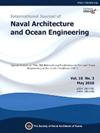Machine learning-based optimal value calculation for welding variables in AR training
IF 3.9
3区 工程技术
Q2 ENGINEERING, MARINE
International Journal of Naval Architecture and Ocean Engineering
Pub Date : 2025-01-01
DOI:10.1016/j.ijnaoe.2025.100652
引用次数: 0
Abstract
Currently, the shipbuilding industry is experiencing a surge in orders due to the rising demand for eco-friendly ships, necessitating the optimal use of available resources for production. However, the production workforce has not fully recovered to the level required to meet these increased orders following large-scale industry restructuring. In particular, there is a shortage of highly skilled welders, and concerns are growing about the transfer of expertise due to an aging workforce and a lack of younger workers. Shipbuilders worldwide face similar challenges and are exploring various methods to transfer the tacit knowledge of skilled welders to less experienced workers, which has introduced unforeseen challenges. In this study, we develop a machine learning algorithm that suggests the optimal values of key welding variables for an AR-based welding training system designed to assist less skilled workers. We collected welding data from highly skilled workers using the FCAW (Flux-Cored Arc Welding) technique, which is commonly employed in the shipbuilding process. The welding variables that represent tacit knowledge were identified and trained using the Extra Trees Regressor model. Subsequently, a welding AR training system was implemented, allowing the trained model to guide users on the optimal values for welding variables. Finally, the effectiveness of this system in training welders was verified at a shipyard technical training center.
基于机器学习的AR训练中焊接变量最优值计算
目前,由于对环保船舶的需求不断增加,造船业的订单量急剧增加,因此必须充分利用现有资源进行生产。然而,在大规模行业重组之后,生产劳动力还没有完全恢复到满足这些增加的订单所需的水平。特别是,高技能焊工短缺,而且由于劳动力老龄化和年轻工人缺乏,人们越来越担心专业知识的转移。世界各地的造船商都面临着类似的挑战,他们正在探索各种方法,将熟练焊工的隐性知识传授给经验不足的工人,这带来了意想不到的挑战。在本研究中,我们开发了一种机器学习算法,该算法为基于ar的焊接培训系统提供关键焊接变量的最佳值,旨在帮助技能较低的工人。我们收集了使用FCAW(药芯弧焊)技术的高技能工人的焊接数据,这种技术通常用于造船过程。使用额外树回归模型对代表隐性知识的焊接变量进行识别和训练。随后,实现了焊接AR训练系统,训练后的模型可以指导用户选择焊接变量的最优值。最后,以某船厂技术培训中心为例,验证了该系统在焊工培训中的有效性。
本文章由计算机程序翻译,如有差异,请以英文原文为准。
求助全文
约1分钟内获得全文
求助全文
来源期刊

International Journal of Naval Architecture and Ocean Engineering
ENGINEERING, MARINE-
CiteScore
4.90
自引率
4.50%
发文量
62
审稿时长
12 months
期刊介绍:
International Journal of Naval Architecture and Ocean Engineering provides a forum for engineers and scientists from a wide range of disciplines to present and discuss various phenomena in the utilization and preservation of ocean environment. Without being limited by the traditional categorization, it is encouraged to present advanced technology development and scientific research, as long as they are aimed for more and better human engagement with ocean environment. Topics include, but not limited to: marine hydrodynamics; structural mechanics; marine propulsion system; design methodology & practice; production technology; system dynamics & control; marine equipment technology; materials science; underwater acoustics; ocean remote sensing; and information technology related to ship and marine systems; ocean energy systems; marine environmental engineering; maritime safety engineering; polar & arctic engineering; coastal & port engineering; subsea engineering; and specialized watercraft engineering.
 求助内容:
求助内容: 应助结果提醒方式:
应助结果提醒方式:


